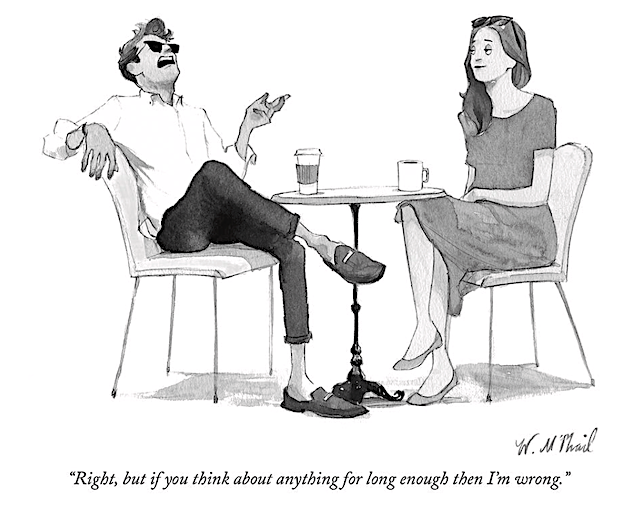The Paradox of the Self
The usual warning. Radical non-duality blather ahead. It makes no sense and is really annoying.
(Want something more interesting to read? Read Indrajit Samarajiva’s blog. Start here. You might have to enter your email to read everything he’s written, but membership is free, and he won’t pester you, though you might find he’ll make you think so differently about so many subjects you’ll find it worthwhile getting a paid subscription, just to encourage him to keep writing.)

My radical non-duality friends repeatedly and patiently point out that the self is an illusion, and that everything that, to the self, appears “real”, is simply an appearance, without weight or substance or significance.
Of course, being a lover of science, and quite infatuated with the message of radical non-duality, this self wants to reconcile my friends’ assertions with new discoveries in astrophysics, quantum science and neuroscience that do in fact confirm that time and space and the self are not “real”, just mental constructs, ways that the brain tries to make sense of the electrochemical signals reaching it.
I am unfazed when my friends smile and say that all of that is just a story, and that were my illusory self to vanish (ie, since there is no time, were it to be obvious that there never was a self), my attempts at reconciling the message to science would be moot, seen as just another endeavour to make sense of what does not and cannot make sense, what is just “this”, nothing ‘everything-appearing’.
So still I persevere, trying to understand, if the self is illusory and actually does nothing, how it might have evolved to be so apparently ubiquitous in the human species?
“There is no evolution”, my friends say. “That would require time in which things could evolve, and separate things to exist that could evolve, and there are neither.”
“Humour me”, I reply. “With such a huge unused brain capacity, it is not unreasonable to think that the human brain might have evolved an elaborate schema, or representation of reality, with the self in the centre of that representation. It doesn’t matter whether that model of reality is ‘true’ or not, it only matters that it ‘makes sense’ of the signals arriving at the brain. After all, the brain clearly tries to make sense of dreams, piecing together completely unreal threads of mental activity into a semi-coherent series of events that seem absolutely real during the dream.”
“Interesting story”, my friends say. “but again, there is no ‘real’ time in which the brain can create or evolve anything. The fact that your explanation makes sense does not mean it actually describes anything real. Lots of stories make sense, but that doesn’t make them true.”
“I’m not done. What if, having created this model or representation of reality, the self immediately suffered a crisis of identity. What if it found the idea of being separate and apart from everything, and being seemingly responsible for the health and safety and decisions of the body it seemed to inhabit, so shocking that it was paralyzed with fear and indecision? What if the self was not just a model or representation of perceived reality, but also a buffer, a veil, to protect itself from the existential terror of separation? You have said that without the self, what is left is ‘life full on’, without the illusion of control, without hope, without the possibility of change. Ghastly to the self! What if that were all just too horrific to bear, so the brain further evolved the self to filter everything (all sense-making) through it, through the self? In other words, what if the self evolved as a protective device for humans who would otherwise find ‘life full on’ completely unbearable?”
“Now you are saying that there are ‘humans’, ‘human beings’, separate from the self, that need protection. There are not.”
“There are apparent humans. You’ve even acknowledged that.”
“No, you are confusing what is illusory and what is apparent. What is apparent is that there is nothing separate. What is illusory is that there is something separate.”
“So you’re saying that you see no apparent humans anywhere.”
“Correct. There is nothing separate. There are things apparently happening, but they’re not happening to anyone, to any separate humans.”
“So there is no thing here, no thing apart.”
“Correct. There is ‘thing-ing’ apparently happening, but there are no things.”
“So no apparent human beings. How then is it so easy for the apparent you to have a mutually coherent conversation with the apparent me?”
“There is no apparent you, or apparent me. There is conversing, but that is just what is apparently happening. It is nothing, apparently conversing. And there is apparently ‘human-being-ness’ happening. But no human beings.”
“Yet you are compassionate about the suffering of all us selves. How could you be compassionate about an illusion?”
“There is no ‘me’ to be compassionate about anything, and there are no selves. Being-compassionate is apparently happening. For no reason. You could say that’s just in the nature of the character, but that would be just a story. Just another attempt to make sense of what cannot be made to make sense, and which does not need to make sense.”
“Well, it does to me.”
“Sorry.”
I’m back talking with my radical-non-duality friend (apparently):
“I’ve been reading Michael Pollan’s book again, that suggests that people under the influence of some drugs suddenly lose their sense of self. That there is a ‘default pathway’ of brain waves that is necessary (though not sufficient) to have a sense of self, that these drugs disrupt. What if we did an MRI study of your brain compared to most people’s and found that your brain does not have the ‘default pathway’ that most people have. Wouldn’t that suggest that there is potentially a surgical way to vanquish the sense of self, in anyone and everyone? No more suffering!”
“Well, in the first place, brains don’t really exist, MRIs don’t really exist, drugs don’t really exist, and surgery doesn’t really exist. There may be the appearance of mental processing, of MRI-scanning, of drug-taking, of surgery-performing, but those are all just appearances, for no reason or purpose. Nothing ‘makes sense’. And, what’s more, there would still be apparent suffering. There is no cause and effect, and no time for anything to happen in. There is no psychedelic or surgical way that would ’cause’ the illusion of the self to disappear, since it never was.”
“But it seemingly was, to ‘me’.”
“That’s the illusion. Your MRI-and-surgery proposal is just a story, and it doesn’t relate to anything real.”
“OK, so there might be apparent MRI-scanning and surgery-performing, and there might be apparent no-longer-having-a-self-afterwards, right?”
“Anything is possible. But it’s only a story. Everything is only apparently happening. It’s not really happening. To repeat: Your MRI-and-surgery proposal is just a story, a conjecture, and it doesn’t relate to anything real.”
“Arrrgh! I knew you were going to say that — ‘Nothing is really happening’. But what if you took the MRI scan and I got the surgery, and in fact there was, afterwards, no self here?”
“There is already no self there. There is no ‘there’ there. And there is no ‘afterwards’ — no time in which these things in your story could ‘actually’ happen. Anything is possible. But nothing is really happening. It’s all just appearances. Claiming to have gotten rid of your self through surgery might be what was apparently happening. So what? Nothing changed. There was no one for anything to change, and no time in which anything could actually change. No self, no surgery. It’s all just a story.”
“I can’t imagine that.”
“Correct. This is unimaginable, in addition to not being real. It’s also obvious, but not to anyone.”
“My head hurts.”
“Sorry.”

Finding the Sweet Spot: the natural entrepreneur's guide to responsible, sustainable, joyful work
"Now what am I going to do?" is a question many people ask—and leave unanswered—at critical potential turning points in their careers. Perhaps you’re a new graduate, but instead of lining up for a boring entry-level job at a big corporation, you wish you could start your own sustainable and responsible business






